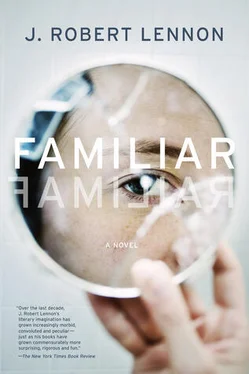“Sam. I don’t understand.”
He’s silent.
Her hands are tangled in her hair; her voice breaks: “It isn’t supposed to be this way!”
But Sam is shaking his head again. “There’s no way anything is supposed to be,” he says. “Things can be as good or as bad as they want.”
He gets up and heads for the door. But then he turns back, leans over her, and kisses her on the cheek. “This is so bizarre and fucked up,” he whispers to her, “all of it.” He picks up the whiskey bottle, holds it up to the light. He slides it into his pocket and walks out.
In the morning, after dreamless unrestful sleep, she gets up, dresses without showering, and leaves her room. It’s just after eight on a Saturday. Silas won’t be out; she can rouse him from bed. She’ll settle it with him. Come to some kind of agreement.
The air is cool, without a trace of moisture. Nothing is open but there’s traffic anyway, as if people are driving for its own sake. She’s walking briskly to combat the fatigue, her tennis shoes making no sound at all against the sidewalk, and it feels like the old life, tired and on the edge. She feels almost normal.
In the early light the house looks dumpier and more vulnerable. The gutters sag and the shingles are coming loose. She climbs the steps, tries the door, and when it proves to be locked she reaches for the bell. But she thinks better of it. Goes around to the back, lets herself into the yard through a low chain-link fence gate. A small screened back porch leads to another door, with a curtained window at eye level. She can make out a washer and dryer and part of the kitchen.
She tries this door, too, and it’s also locked. But inside a rusted coffee can, on a bookcase slumped against the back wall of the house, she finds a key. It feels too heavy in her hand, and too cool, as if it has borrowed these properties from some other object, in some other place.
Silas used to lock his bedroom door, would lock her out, as early as age two. They found a way to jimmy it open — a tiny screwdriver or tweezers in the hole in the knob — but eventually Silas discovered this and stole everything in the house that could conceivably be used for unlocking. Derek began to keep a collapsible screwdriver on his key ring, but around the time he turned seven or eight, Silas managed to get his hands on a safety bolt, which he installed crudely on his side of the door, bypassing the knob entirely. They could have removed this, too, of course, when he was at school. If she remembers right, they may even have done so, once or twice. But the real answer was to give up.
This turned out to be the answer to a lot of things, with Silas.
Well, here are the results. They are cynical and unhappy here, on their own, and she and Derek are delusional and unhappy at home. She has created a family of miserable loners who seem incapable of helping one another.
Was there anything she could have done that would have resulted in a satisfactory outcome?
She needs to believe that the answer is no.
She slides the key into the lock, and a moment later she is standing in the messy kitchen, her heart pounding. Breaking and entering. But this isn’t her real life, is it. This is where things are different. She is seeing if she can make things change. Hands shaking, she sets the key on the counter.
The house is quiet. She moves into the living room, which is as disorderly as the kitchen. The fingerprinted residue of cocaine smears the coffee table’s filthy glass surface. Cut up plastic drinking straws and a razor blade. There’s a wad of Kleenex stained by blood and an ashtray filled with cigarette butts and the twisted paper ends of joints.
A hallway leads away from here and she walks down it. The bathroom door is open, and three others are closed. No light is visible beneath one — a closet. She takes a breath and opens the next.
It is hard to imagine a sadder sight. Sam is lying asleep and fully clothed on an unmade bed, the sheets twisted together and trailing across the carpet, where movie and gaming magazines are spread within easy reach. The dresser drawers are all open and unfolded laundry spills out, mingling with the dirty shirts and pants that litter the floor. There’s a smell of sweat and shit and come, and nothing hangs on the walls. The window shade is up. It looks out on an overgrown half-dead shrub and beyond it the back of another house.
She withdraws, pulls the door shut, then stands in the hallway drawing and releasing steady breaths. She remembers the game, Silas’s game, a scene in which she walked through an empty apartment, with the intent of finding something, a handwritten letter, in a drawer. In her memory the experience seems real, no different from her memories of things she has actually done. If she stayed here, standing in the hallway, doing nothing, then nothing would happen, forever. This is how she feels. The world suddenly is very limited. So little seems possible — almost nothing, when you get down to it. She is struck suddenly by a powerful conviction, that she will exhaust this world’s potentiality soon — that she will reach a city wall, or a high cliff, or a door that won’t open, there will be nothing beyond this obstacle, and that will be the end. She can feel the membrane that separates this stunted universe from the next; for a moment it seems as though she can actually see it, the faint curvature of the circular world as it swallows its tail, closes in, sealing itself off from the horror of infinity. Her hand reaches out and finds the wall; the coarse unsanded surface feels very real. She walks to the end of the hall and opens the last door.
It is, by contrast, incredibly tidy. There are several computer screens set up on an angled desk, a case of reference books, an Oriental rug half covering a hardwood floor. The bed is made with bright red sheets, and the girl is curled underneath them, her red hair and cheek anemic-looking against the pillowcase. Beside her Silas is sitting up, his shirtless back against the headboard, with a paperback book in his hand. On his face is an expression of profound surprise.
Elisa feels a surge of excitement, almost joy. She stares at him. Then she turns and goes back to the kitchen and sits down at the table.
Silas appears a minute later, wearing boxer shorts and a clean white tee shirt. He has recovered from his astonishment. He says, “What the fuck.”
“Sit down,” she says, and the conviction in her voice surprises her; it does not match her emotions. “We have something to discuss.”
He appears vulnerable here, without a drink in his hand. He’s thin, she can see that he’s unhealthy. But his eyes are alive with calculation.
After a moment he pulls out a chair and sits. On the counter behind him stands the object that preoccupied her yesterday, the mason jar filled with brown liquid. She intends to make demands, arrangements, to save his brother. Instead she says, “What is that?”
He frowns, turns, looks around. When he turns back to her, he’s angry: she has surprised him again. “What’s what?”
“That.” She points. “In the jar.”
Clearly he doesn’t want to turn again, doesn’t want to be tricked or thrown off balance. But he can’t help it, he looks.
After a moment, he says, “I have no fucking idea.”
“Really?”
“Some rotten shit from the fridge, I don’t know. This is why you’re here? You break into my house to ask me this?”
She says, “You have to let your brother go.”
Silas squints at her. He drums his fingers on the tabletop; his other hand twitches on his bare knee. He looks like he should be smoking a cigarette and indeed glances around as if one might be there, freshly lit, waiting for his fingers.
Читать дальше












